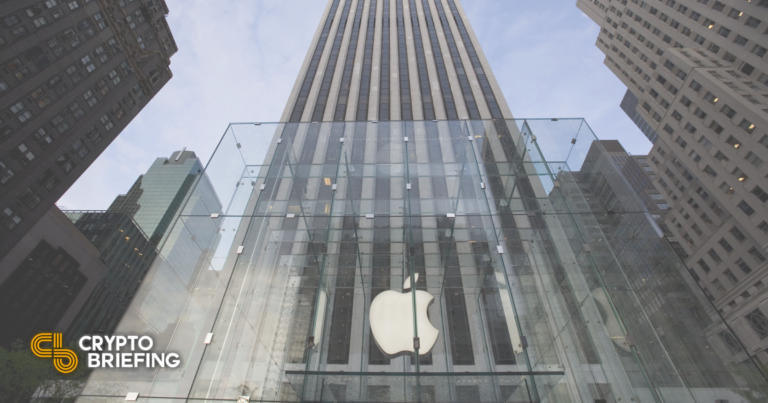
Key Takeaways
- Apple has reportedly blocked Gnosis Protected’s cell pockets app from the App Retailer as a result of it shops NFTs.
- The company reportedly said that applications storing NFTs are “not appropriate” for the App Store.
- Apple reportedly stated that crypto apps providing NFTs should both make them out there to App Retailer customers as in-app purchases or take away them from the app completely.
Apple has reportedly blocked Gnosis Safe’s new mobile wallet application from releasing on the App Store because it facilitated storage of NFTs not bought through in-app purchases.
Apple Reportedly Blocks Apps Supporting NFTs
Apple has reportedly acknowledged that purposes storing or displaying NFTs are breaking the App Retailer’s phrases of service.
Gnosis Safe, a multi-sig crypto wallet allowing users to manage digital assets on Ethereum, reportedly tried releasing a new, updated version of its iOS wallet application on the App Store two weeks ago. To the mission’s shock, Apple blocked the discharge, citing the pockets’s NFT storage performance as the rationale.
According to the email exchanges between Gnosis and Apple shared by Lucas Schor on Twitter, Apple says that applications that include access to NFTs by means other than in-app purchases violate the App Store’s guidelines. In line with a screenshot shared by Schor, App Retailer wrote:
“The app allows users to store and send NFT’s (sic) which are digital items in nature in the Collectibles section of the app. This function just isn’t applicable for the App Retailer.”
Assuming the message was a human error, Gnosis says it reached back to Apple but got the same response. “Since NFTs are digital property which have a value and value related to them,” the e-mail from Apple reads, “Apps that entry, whether or not it’s simply easy storage or market, should not applicable for the App Retailer. We suggest you remove this feature from your app.”
Apparently, Gnosis Protected’s cell pockets software improve had nothing to do with NFTs, because it’s been providing this performance for a number of months with none points. Moreover, other iOS crypto wallets, including the most popular crypto wallet with over 10 million active monthly users, MetaMask, allow users to store and even directly sell NFTs from their wallets.
Apple forces purposes listed within the App Retailer to make use of its in-app buy system, charging as much as a 30% fee on downloads and in-app gross sales and subscriptions. Last month, Epic Games sued Apple over monopolistic practices after having their most popular game, Fortnite, delisted from the App Store for circumventing the 30% through direct in-game payments. On Sep. 10, Federal Choose Yvonne Gonzalez Rogers gave its last verdict in favor of Apple on all accounts.
Apple reportedly claims that all crypto applications offering NFTs (paid digital content) must either make them available to App Store users as in-app purchases or remove the functionality from the applications entirely. In line with Schor, eradicating NFTs just isn’t an choice for Gnosis. Commenting on the difficulty on Twitter, he said:
“This shows how access to Web3 still relies heavily on gatekeepers like Apple. It’s an business drawback, as the identical arguments apply to any pockets displaying NFTs or video games making use of NFTs. We need to find better ways to make Web3 accessible on mobile permissionlessly.”
If Apple determined to implement this coverage extra broadly, MetaMask and different crypto wallets must take away the NFT storage performance from their iOS merchandise.


















